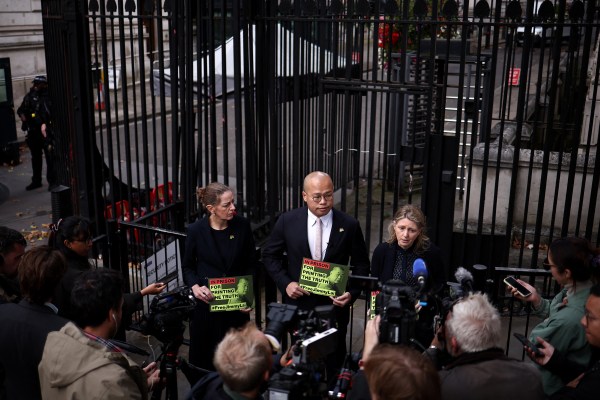Happy Friday—we hope your week was less chaotic than it’s been for congressional Democrats.
President Joe Biden pushed back his departure to Europe for a G20 meeting in Rome and a climate summit in Scotland yesterday in an attempt to bring his party closer to agreement on a whittled down Build Back Better bill. The White House rolled out a $1.85 trillion framework of the legislation and Biden trekked to Capitol Hill to huddle Thursday morning with House Democrats in an attempt to find unity.
The plan came after weeks of negotiations between Democratic leaders and comparatively centrist Democratic Sens. Joe Manchin and Kyrsten Sinema. Progressives in the House had looked to those talks for details on which policies Manchin and Sinema will ultimately support—but the two senators made rather enigmatic statements about the deal, leaving their votes in doubt.
The lack of clarity led to yet another delay for a different bill—the bipartisan infrastructure package that passed the Senate in August. (Also somewhat goofily known as the BIF.) House Speaker Nancy Pelosi told her members Thursday morning that she wanted to bring the infrastructure bill to the House floor for final passage before Biden landed in Europe—and she warned them against embarrassing the president by voting against it. The legislation includes hundreds of billions of dollars to revamp the nation’s roads, bridges, airports, and to expand broadband access, among other items.
But throughout the day it became evident that a vote was unlikely to materialize. Progressives remained firm they would not support the infrastructure package until it was paired with a vote on the larger Build Back Better package. Rep. Rashida Tlaib told reporters that she was a “hell no” on the infrastructure bill. And Progressive Caucus Chair Pramila Jayapal said there were “too many no votes” among her caucus.
There was some movement, though. Democrats introduced legislative text of the deal, and the House Rules Committee convened for a hearing on the legislation. At times—as the Rules Committee does—it devolved into a partisan sparring match. Republicans noted that the nonpartisan Congressional Budget Office had not yet scored the bill and argued new spending on social programs would exacerbate inflation.
Despite the scheduling setbacks, some Democrats continued to express optimism that the deal will come together soon: “We’re not voting on this bill today. We’ll continue to have this discussion,” Rules Committee Chairman Jim McGovern said. “But I am proud of this bill. I am proud of President Biden.”
Pelosi later issued a letter to members confirming the bipartisan infrastructure bill would be delayed. She added that “the good news is that most members who were not prepared for a yes vote today have expressed their commitment to support the BIF.”
“It is both heartening and impressive to observe the strength of Members’ engagement in the discussion,” she wrote.
Rep. Maria Elvira Salazar Q&A
Earlier this year, we did an edition of Uphill checking in with two House freshmen about their time in Congress thus far. This week, we sat down with longtime television journalist and Florida freshman Rep. Maria Elvira Salazar. Earlier this year, Salazar was among the few House Republicans who voted to remove Georgia Rep. Marjorie Taylor Greene from her committees. She was also one of 35 House Republicans to support forming a January 6 commission. She is a member of the Foreign Affairs Committee and has recently pushed for a House vote on the Senate-passed RENACER Act to counter human rights abuses in Nicaragua. The interview has been edited for length and clarity.
Haley: You used to work as a journalist, holding people accountable.
Salazar: I miss it. I miss it a lot. I loved it.
Haley: Is it strange to be on the other side?
Salazar: Very strange. It’s very strange. But now I have become an even better journalist. If I were to go back? God, I would crush everyone.
Haley: What’s the biggest difference between your career as a journalist and doing this job?
Salazar: That you were not responsible for so many people. I really believe what I'm doing, and I do believe that I have to be out there for the Nicaraguans and for the Cubans and for the Central Americans, and help the people that don't have a legal status in this country. … That big responsibility—I didn't have when I was on the air. I knew I was doing a good job. I was explaining the news, what was happening in the political world to my viewers, and I knew that at eight o'clock, nine o'clock at night, it was over and I had done my job. Here, you never end doing the job if you're going to do it right.
Haley: Are there any similarities between those jobs?
Salazar: Basically the communication skills. You have to express to others what you think and what you know. And to convince them to either vote for you or to give you ratings or stay with you. ... Because on television it's how many viewers you have. In politics it’s how many people, how many voters you get.
Haley: Is there anything that’s surprised you in the House?
Salazar: How government works. How could this be so slow and inefficient? While in the private sector, you’ve got to deliver, there’s accountability, here, there’s not that much. And that’s frustrating.
Haley: Congress is very top-down. Leadership tells you how they think you should vote. What do you think about that system? Does the GOP leadership give you enough room to vote how you want to?
Salazar: Absolutely. A lot more than Nancy Pelosi. I can attest to that. The GOP is very democratic. Very democratic. There is no way that Kevin McCarthy grabs you by the neck like Nancy does. It's not happening. And I haven't seen it.
Haley: Are you planning to vote for the bipartisan infrastructure bill if it comes to the floor?
Salazar: At this hour, I can’t. I don’t know, but I don’t think I’m going to because it’s too inflated. It’s too socialist.
Haley: How do you prepare for committee hearings?
Salazar: I think like a news reporter. I cannot stop being a reporter. What are the topics, what are the headlines, what are the important topics that I need to cover? We’re going to do this in three minutes and that’s it. It’s very news oriented.
Haley: What is your favorite part of the job?
Salazar: It’s highly gratifying. When you go back to the district and you see people say, ‘Oh my God, thank you for what you’re doing for us!’ that has taken me to a higher level. Because when I was in television, people would say, ‘Yes, thank you, I love what you're saying. You’re informing us and I love the way you cover the news and what you said yesterday in this comment, that comment,’ but now I have influence. Now I can actually influence those actors.
Haley: You weren’t here on January 6. You had coronavirus.
Salazar: I was in a hospital bed and I thought I was going to die.
Haley: Were you following the news at all on January 6?
Salazar: I wasn’t. I really wasn’t understanding very well.
Haley: How has that been for you, working with members who were here or traumatized by hiding in their offices for hours?
Salazar: It's a very unfortunate event, but we’re still the most important, most solid democracy in the world. So that is an event that should have not been written in the history books, but that we can surpass as a country and as a nation because our very solid institutions. If that would have happened in Peru or Nicaragua, it would have been a major schism. But we can surpass.
Haley: You voted for the January 6 commission, which would have been an even partisan split, but you did not support the committee that exists now.
Salazar: What we voted for was the right way of conducting business. You know, five-five, up until December 31. Bring everything out, what Nancy knew, what the sergeant at arms knew, what the Trump administration knew. Everything, out in the open, put it on the table. Let's see who's guilty and who’s not. I really wanted to know what Madam Speaker knew at the time. And now we will never know because she's not going to prosecute herself. Now she controls it.
Haley: You voted against holding Steve Bannon in contempt recently. What was your reasoning?
Salazar: It’s not for Congress to decide if this guy should face criminal charges. That’s for a court of law or for the president or for the executive, not for us. And this is highly partisan. This is highly partisan. So I don't want to play politics when it comes to indicting someone. I'm not saying that he is or he's not, but I’m not here to judge.
(Editor’s note: You can read how contempt of Congress works in last Tuesday’s Uphill. While Congress voted to hold Bannon in contempt, the decision on whether to prosecute him falls to the Justice Department.)
Haley: What legislation have you worked on that you’re proudest of?
Salazar: I haven’t presented it yet—an immigration reform law we’re going to present. The name is DIGNITY. And that is going to be the most important piece of legislation that I will ever be able to do while I’m here.
Haley: When do you expect to introduce it?
Salazar: Sometime before the end of the year or at the beginning of the year.
Haley: You’re a Christian. How do you bring your faith to the job?
Salazar: I bring it every day, every minute. I’m in the hands of God. So I’m here to fight the good fight, help others, do the common good. And try to see if I could change people’s lives for the better. And that’s my mission, and I believe that God is guiding me.
Haley: Is there anything about your faith that makes working in Congress difficult?
Salazar: It gives you peace. Whatever He wants, whatever His perfect will will be, will be. So why should I worry about it? So I’m enjoying the job. I’m at peace. The stress is because of the schedule, not because of the worries.
Haley: As a journalist, I thought you might have some thoughts on this. There's been increasing hostility about journalists and journalism in general—
Salazar: We’re not doing our jobs. We’re not doing jobs, period. The American school of journalism says that you've got to present the news in an impartial and bipartisan way and to have the viewer or the reader decide what he or she wants to think. Who am I to say that this is good, and that's bad? We’ve lost it. I would have been so embarrassed and fired if I would have conducted myself the way I see many of the anchors doing it on cable news. Oh, fired. But you know, I started 37 years ago, when you had Peter Jennings and Barbara Walters and Walter Cronkite and those people that respected their profession. They were saying the truth, not whatever they thought, whatever they wanted the truth to be.
Haley: When you were a journalist, other than some of those big interviews that you did, like with Castro, are there any stories that maybe aren't as high profile that you just really enjoyed?
Salazar: Well Fidel, when I interviewed Fidel, I can tell you that I met Satan. Fidel is Satan, and you feel it. It’s not that I’m Cuban American, I mean, because I could say the same thing to you about Pinochet, who was another dictator hated by the left. And I could say the same thing to you about Maduro, I met him three years ago. Those are really bad dictators. Oh, no, no, no, the real, real Satan is Fidel Castro, and you feel this aura, this chemistry, this vibes, whatever you want to call it, whichever you want to describe, where you feel that you're in the presence of Satan, of the devil himself. You feel it on your skin. That will stay with me forever. It’s in my cellular memory.
Haley: Are there any members of Congress that you have formed strong friendships with, people you’re inspired by?
Salazar: I love my freshman class. Young Kim, Michelle Steel, [Nicole] Malliotakis, Carlos Gimenez. Peter Meijer, I love him. He is courageous. He is really brave. I love Anthony Gonzalez, but now he says he's not coming back.
Haley: Do you ever speak with Ileana Ros-Lehtinen, who held your seat for decades?
Salazar: Oh yes, I talk to her all the time when I go back to the district and I say you know, you were the one who created this path to walk on.
Haley: Has she given you any advice that stands out to you?
Salazar: She says we’re doing great. So I always tell her, “You call me and you tell me if you see something that I shouldn’t be doing.” And you know, I interviewed her many times. Many times. So now I see what she’s thinking.
Of Note






Please note that we at The Dispatch hold ourselves, our work, and our commenters to a higher standard than other places on the internet. We welcome comments that foster genuine debate or discussion—including comments critical of us or our work—but responses that include ad hominem attacks on fellow Dispatch members or are intended to stoke fear and anger may be moderated.
With your membership, you only have the ability to comment on The Morning Dispatch articles. Consider upgrading to join the conversation everywhere.